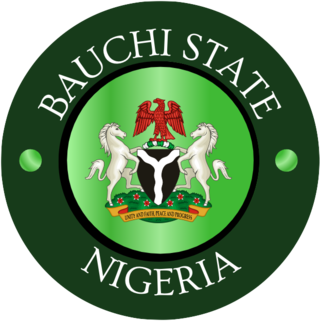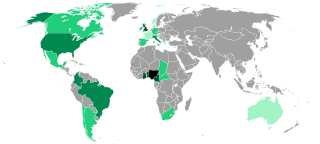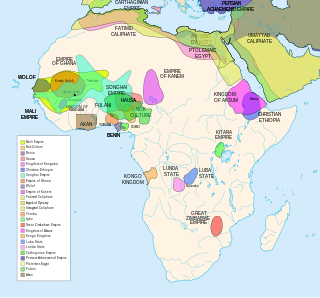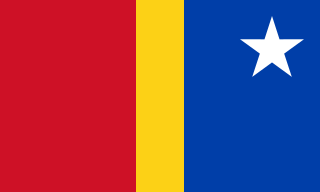Related Research Articles
Shehu Usman ɗan Fodio was a Fulani scholar, Islamic religious teacher, revolutionary and a philosopher who founded the Sokoto Caliphate and ruled as its first caliph. After the successful revolution, the "Jama'a" gave him the title Amir al-Mu'minin. He rejected the throne and continued calling to Islam.

The Sokoto Caliphate, also known as the Sultanate of Sokoto, was a Sunni Muslim caliphate in West Africa. It was founded by Usman dan Fodio in 1804 during the Fulani jihads after defeating the Hausa Kingdoms in the Fulani War. The boundaries of the caliphate are part of present-day Cameroon, Burkina Faso, Niger, and Nigeria. By 1837, the Sokoto state had a population of around 10-20 plus million people, becoming the most populous empire in West Africa. It was dissolved when the British, French and Germans conquered the area in 1903 and annexed it into the newly established Northern Nigeria Protectorate, Senegambia and Niger and Kamerun respectively.
Muhammadu Bello was the second Sultan of Sokoto and reigned from 1817 until 1837. He was also an active writer of history, poetry, and Islamic studies. He was the son and primary aide to Usman dan Fodio, the founder of the Sokoto Caliphate and the first Sultan. During his reign, he encouraged the spread of Islam throughout the region, increasing education for both men and women, and the establishment of Islamic courts. He died on October 25, 1837, and was succeeded by his brother Abu Bakr Atiku and then his son, Aliyu Babba.
Anarchism in Nigeria has its roots in the organization of various stateless societies that inhabited pre-colonial Nigeria, particularly among the Igbo people. After the British colonization of Nigeria, revolutionary syndicalism became a key factor in the anti-colonial resistance, although the trade union movement deradicalized and took a more reformist approach following the country's independence. The contemporary Nigerian anarchist movement finally emerged from the left-wing opposition to the military dictatorship in the late 1980s and saw the creation of the Awareness League.

Indirect rule was a system of governance used by imperial powers to control parts of their empires, particularly used by colonial empires like the British Empire to control their possessions in Africa and Asia, which was done through pre-existing indigenous power structures. Indirect rule was used by various colonial rulers: the French in Algeria and Tunisia, the Dutch in the East Indies, the Portuguese in Angola and Mozambique and the Belgians in Rwanda and Burundi. These dependencies were often called "protectorates" or "trucial states". By this system, the day-to-day government and administration of areas both small and large were left in the hands of traditional rulers, who gained prestige and the stability and protection afforded by the Pax Britannica, at the cost of losing control of their external affairs, and often of taxation, communications, and other matters, usually with a small number of European "advisors" effectively overseeing the government of large numbers of people spread over extensive areas.

Bauchi State is a state in the North-East geopolitical zone of Nigeria, bordered by Jigawa to the north, Yobe to the northeast, Gombe to the east, Taraba and Plateau to the south, Kaduna to the west and Kano to the northwest. It takes its name from the historic town of Bauchi, which also serves as its capital city. The state was formed in 1976 when the former North-Eastern State was broken up. It originally included the area that is now Gombe State, which became a distinct state in 1996.

Northern Nigeria was an autonomous division within Nigeria, distinctly different from the southern part of the country, with independent customs, foreign relations and security structures. In 1962, it acquired the territory of the British Northern Cameroons, which voted to become a province within Northern Nigeria.

Gobir was a city-state in what is now Nigeria. Founded by the Hausa in the 11th century, Gobir was one of the seven original kingdoms of Hausaland, and continued under Hausa rule for nearly 700 years. Its capital was the city of Alkalawa. In the early 19th century elements of the ruling dynasty fled north to what is today Niger from which a rival dynasty developed ruling as Sarkin Gobir at Tibiri. In 1975 a reunited traditional sultanate took up residence in Sabon Birni, Nigeria.

The Jos Plateau is a plateau located near the centre of Nigeria. The plateau has given its name to the Plateau State in which it is found and is named for the state's capital, Jos. The plateau is home to people of diverse cultures and languages. The plateau's montane grasslands, savannas, and forests are home to communities of plants and animals distinct from those of the surrounding lowlands and constitute the Jos Plateau forest-savanna mosaic ecoregion.
The economic history of Nigeria falls into three periods. They are the: pre-colonial, the colonial and the post-colonial or independence periods. The pre-colonial period covers the longest the part of Nigerian history. The colonial period covers a period of 60 years, 1900-1960 while the independence period dates from October 1, 1960.
The Berom is one of the largest autochthonous ethnic group in Plateau State, central Nigeria. Covering about four local government areas, which include Jos North, Jos South, Barkin Ladi (Gwol) and Riyom. Berom people are also found in some southern Kaduna State local government areas like Fadan Karshe with Berom settlers tracing their origins to Za'ang (Zawan) a Berom district on the Jos Plateau. They emigrated during the British Colonial Government of Nigeria. A large number of this tribe, if not all, are Christians. Statistics also have it that a large number of the population of Plateau State is made up of Berom people.

Colonial Nigeria was ruled by the British Empire from the mid-nineteenth century until 1960 when Nigeria achieved independence. Britain annexed Lagos in 1861 and established the Oil River Protectorate in 1884. British influence in the Niger area increased gradually over the 19th century, but Britain did not effectively occupy the area until 1885. Other European powers acknowledged Britain's dominance over the area in the 1885 Berlin Conference.

Nigerians or the Nigerian people are citizens of Nigeria or people with ancestry from Nigeria. The name Nigeria was derived from the Niger River running through the country. This name was allegedly coined in the late 19th century by British journalist Flora Shaw, who later married Baron Frederick Lugard, a British colonial administrator. Nigeria is composed of various ethnic groups and cultures and the term Nigerian refers to a citizenship-based civic nationality. Nigerians are derived from over 250 ethno-linguistic groups. Though there are multiple ethnic groups in Nigeria, economic factors result in significant mobility of Nigerians of multiple ethnic and religious backgrounds to reside in territories in Nigeria that are outside their ethnic or religious background, resulting in the mixing of the various ethnic and religious groups, especially in Nigeria's cities. The English language is the lingua franca of Nigerians. Nigeria is divided roughly in half between Muslims, who live mostly in the north, and Christians, who live mostly in the south; indigenous religions, such as those native to the Igbo and Yoruba ethnicities, are in the minority.

African empires is an umbrella term used in African studies to refer to a number of pre-colonial African kingdoms in Africa with multinational structures incorporating various populations and polities into a single entity, usually through conquest.

Kororofa was a multiethnic state and/or confederacy centered along the Benue River valley in what is today central Nigeria. It was southwest of the Bornu Empire and south of the Hausa States. They rose to prominence before 1500, were in conflict with their more powerful neighbours in the 17th century, and reduced to a small tribute state by the 18th century. It is believed that Kwararafa was either a confederacy conquest state, led by the modern Jukun people or perhaps a collective name given by their Muslim foes for a number of pagan peoples to their south.

Shehu al-Hajj Muhammad al-Amîn ibn Muhammad al-Kânemî (1776–1837) was an Islamic scholar, teacher, religious and political leader who advised and eventually supplanted the Sayfawa dynasty of the Kanem-Bornu Empire. In 1846, Al-Kanemi's son Umar I ibn Muhammad al-Amin became the sole ruler of Borno, an event which marked the end of the Sayfawa dynasty's eight hundred year rule. The current Shehu of Bornu, a traditional ruler whose seat remains in modern Borno State, Nigeria, is descended from Al-Kanemi.
Arewa or Arewaland is a Hausa word which means "The North". The term is used to refer to Northern Nigeria general. The terms Arewa and Arewacin Nijeriya are used in Hausa to refer to the historic region geopolitically located north of the River Niger.
The continued use of the term, Arewa ... has conjured up an image among educated Northerners that resonated far beyond the institutional structures Sir Ahmadu Bello created: the successor to the Bornu and Sokoto Caliphate; the vision of God's Empire in the region; the universality of its claim to suzerainty; and in a more prosaic but no less powerful sense, the concept of a polity with an emphasis on unity and sense of shared purpose in northern West Africa beyond the popular slogan--'one North, one People'.

Abu Bakr bin Ibrahim al-Kanemi CBE, was the Shehu of Bornu from 1902 to 1922.

The Kano Emirate was a Muslim state in Northern Nigeria formed in 1805 during the Fulani jihad when the Muslim Hausa-led Sultanate of Kano was deposed and replaced by a new emirate which became a vassal state of the Sokoto Caliphate. During and after the British colonial period, the powers of the emirate were steadily reduced. The emirate is preserved and integrated into modern Nigeria as the Kano Emirate Council.
Elizabeth Mary Isichei is a New Zealand author, historian and academic.
References
- 1 2 3 Tambo (David C.) Nigerian history collection. Online Archive of California. Retrieved 18 June 2019.
- ↑ The International Journal of African Historical Studies , Vol. 9, No. 2 (1976), p. 370.
- ↑ Prelinger, Richard. (Ed.) (1991) Footage 91: North American Film and Video Sources. Prelinger Associates. ISBN 0927347032